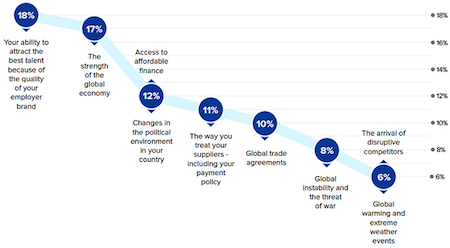The threat of cybercrime, the looming possibility of government or legislative changes and a lack of available talent are seen as the top threats facing global companies’ success today, according to a recent survey of C-Level executives released by global PR network Worldcom Public Relations Group.
According to the Worldcom survey, cybercrime is universally seen as a major threat to business’ plans — though particularly among larger and global organizations — with only 22 percent of business leaders suggesting they feel confident in their ability to protect their organization from cyberattacks. At least 50 percent more U.S. companies see cybercrime as a greater threat compared to companies located in other regions, although 60 percent more U.S. companies also said they're confident in their ability to protect themselves against cybercrime compared to companies stationed abroad.
A spate of government or legislative changes on the horizon this year — such as Brexit, U.S. travel bans and forthcoming changes to NAFTA — was seen as the number-one threat facing businesses’ future objectives. On the other hand, business leaders don’t seem to consider these challenges much of a priority, as more than a quarter — 26 percent — gave government/legislative change the lowest ranking when asked what threats would hold their attention the most in 2018.
 C-Level executives were asked: “Which of the following topics do you think will have the most influence on your success in the next 12 months?” |
However, an ability to attract top talent was cited as the number-one criteria for companies this year and the variable most likely to have an impact on their business' success in 2018, ranking three times higher than disruptive competition and even beating out worries surrounding the strength of the global economy.
Attracting, retaining and energizing employees appears to be a primary goal for companies of all sizes this year, as the study revealed that 43 percent more C-Level executives said employees would receive the bulk of their attention in 2018 compared to last year.
Conversely, when we asked about potential sources of optimism in the market today, an available talent pool received the second lowest ranking, at just six percent.
These anxieties seem especially pronounced among business leaders working for smaller organizations, 71 percent more of whom believe their ability to attract talent would have the single greatest influence on their success compared to larger organizations.
Despite a lower than average confidence in ability to attract and retain quality talent, business leaders remain surprisingly optimistic about their ability to satisfy customers, rating it as their top source of optimism for the year.
The findings come as part of Worldcom's inaugural Worldcom Confidence Index, an annual report dedicated to highlighting trends and key issues global business leaders believe will most influence their organization's success in the coming year. The report was conducted by independent research companies Research Now and 3Gem and polled more than 580 C-Level executive respondents living in China, France, Germany, Italy, Japan, United Kingdom and the United States via an online survey.


 Most company leaders feel that they’re doing a good job when it comes to internal comms, according to communications management platform Axios HQ. Employees, however, aren’t quite so sure.
Most company leaders feel that they’re doing a good job when it comes to internal comms, according to communications management platform Axios HQ. Employees, however, aren’t quite so sure. More than a third of small-business owners continue to work with their most problematic clients, according to a recent report.
More than a third of small-business owners continue to work with their most problematic clients, according to a recent report. The November presidential election could set into motion a period of uncertainty, social unrest and panic, which includes disruption in many workplaces. Here are a few steps business leaders can take to avoid an employee election meltdown.
The November presidential election could set into motion a period of uncertainty, social unrest and panic, which includes disruption in many workplaces. Here are a few steps business leaders can take to avoid an employee election meltdown. Without financial transparency about both salaries and profits, there will always be a degree of suspicion as to where all the profits go, as well as resentment from the staff for the strict code of secrecy about agency finances in general. (1 reader comment)
Without financial transparency about both salaries and profits, there will always be a degree of suspicion as to where all the profits go, as well as resentment from the staff for the strict code of secrecy about agency finances in general. (1 reader comment) WPP’s Mark Read has hired Jacqui Canney, executive VP-chief people officer at Wal-Mart Inc., to oversee talent management, leadership development, rewards and recruiting activities of the ad/PR combine.
WPP’s Mark Read has hired Jacqui Canney, executive VP-chief people officer at Wal-Mart Inc., to oversee talent management, leadership development, rewards and recruiting activities of the ad/PR combine.


 Have a comment? Send it to
Have a comment? Send it to 
No comments have been submitted for this story yet.